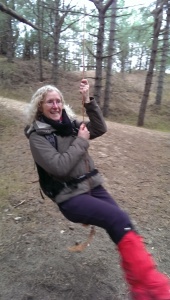Recently I got to sing and play with a bunch of lovely strangers. Let me tell you, once you have been hoisted aloft by two strong men whilst belting out the closing lines of ‘I can do it!’, there’s no going back. Never heard that song? Me neither, until seconds before the words and tune came out of my mouth. It was the final number in an improvised mini musical set in the Juilliard Music School, New York. I was a flautist who’d finally conquered her confidence issues. I don’t know what it sounded or looked like to the improvisers watching, all I know is how it felt – and it was fan-flipping-tastic! In that moment, arms stretched to the ceiling, voice soaring, I was Liza Minnelli, Bette Midler and a dash of Ethel Merman all rolled up together.
This was just one of multiple life-affirming moments I experienced during The Maydays’ improv intensive at Osho Leela, a retreat centre in Dorset. I loved it all, but I REALLY loved the musical improv.
I’ve always enjoyed singing – never in a formal capacity, you understand – school choirs were for kids who sang from the same (hymn) sheet, whereas I was a self-styled maverick teenager, intent on cutting off my proverbial nose to spite my flawlessly made-up face.
At home it was different. In the privacy of my own bedroom I sang my heart out. Years later I found out my mum learned to gauge my general health by whether or not I was singing. Forty years on, it’s still the same. Sadness or sickness render me voiceless.
Neither of my parents were musical, as such, although my dad has a great singing voice and could always be found at the end of family parties in the company of his brothers – six of them together on a good night- pints in hand, working their way through all the old London classics. What a treat to have heard them. Today – who knows? – they might have made it onto Gareth Malone’s Naked Choir. They’d have certainly given it their all.
I used to love musicals when I was growing up. My earliest memory of theatre going was a trip to London for my eleventh birthday to see the original production of Grease. Several years ahead of the blockbuster film version, it starred TV actor Paul Nicholas as Danny and ‘Evita in waiting’ Elaine Page as Sandy. I was mesmerised. I was hooked.
Then, at some point in my early 20s, my love affair with musicals ended. They were silly and frivolous, which, of course, generally, is their whole point. You don’t go to see a musical for the complex storyline and nuanced character development. You go for the knockout songs that course through your bloodstream for days afterwards. My mum has never forgotten the time I took her to see Joseph at a theatre in Middlesbrough. And I will always remember the sight of my mum – a woman who normally shuns any kind of attention – standing up, dancing and clapping along to the reprise of ‘Any Dream Will Do’, face lit up like a Christmas tree.
I reckon you can’t beat that kind of musical high. So, ‘Power Ballad, Fame School, La Scala top-billing’ Melanie is back, and from now on I shall be seeking more opportunities to let my singing voice out to play and giving my inner diva all the encouragement she needs.

